Is being a Food Inspector your dream career option? Check out the complete step by step process on how to become a Food Inspector, Eligibility, Exams, Skills Required and Salary in 2023.
A Food Inspector is a professional who ensures food safety by analysing the components and ingredients used in a consumable. They review and analyse every food unit by ensuring all health and sanitation measures are maintained from the inception till the packaging of the food. Moreover, they report to authorities in case of non-compliance or hazardous conditions. Food inspection is needed for compliance with healthy food practices.
The career path of a food inspector consists of clearing class 12 with PCB, pursuing a degree in Food Technology, Dairy Technology or related fields, and preparing for an All India Food Inspector Exam conducted by UPSC known as FSSAI. Candidates must check the food inspector exam qualification requirement before appearing for the written exam. After clearing the written exam, candidates must qualify for the interview round. Ultimately, they will be eligible to apply for a food inspector job.
Table of Contents:
- How to Become a Food Inspector?
- Who is a Food Inspector?
- What Does a Food Inspector Do?
- Skills Required to Become a Food Inspector
- Types of Food Inspectors
- Salary of a Food Inspector
- Top Recruiters of Food Inspectors
- Advantages of Becoming a Food Inspector
- Disadvantages of Becoming a Food Inspector
How to Become a Food Inspector?
Candidates who wish to learn how to become a food inspector in India can refer to the below steps. It is crucial that they first identify all the necessary skills and are confident in executing all duties as a Food Inspector before taking the career path. It takes 5 to 10 years after class 12 to become a Food Inspector in India.
- Step 1: Pass Class 12
- Step 2: Obtain a Degree
- Step 3: Take FSSAI Exam
- Step 4: Take an Internship
- Step 5: Apply for Food Inspector Jobs
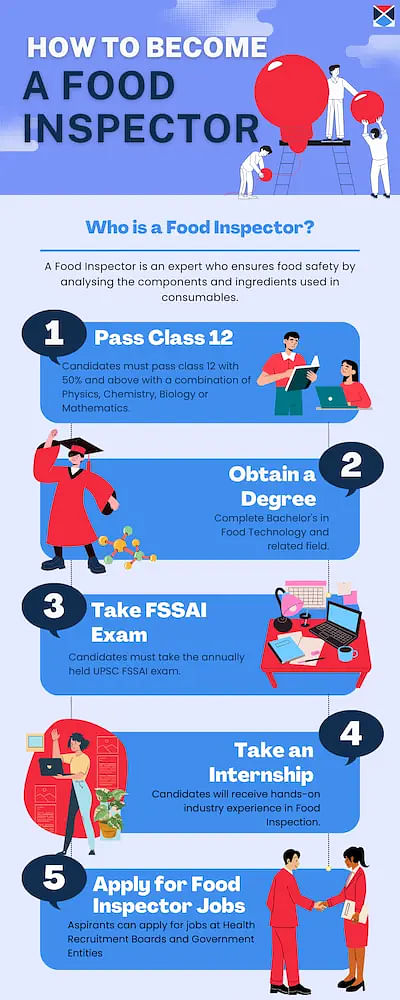
Step 1: Pass Class 12
Candidates must clear class 12 exams with a minimum of 50% marks. Importantly, candidates must have a combination of Chemistry, Physics, Mathematics or Biology. Most colleges require students with a strong knowledge of Science subjects to become Food inspectors.
Alongside, candidates must begin preparations for entrance exams required to pursue undergraduate food inspector courses in India.
Step 2: Obtain a Degree
Candidates who wish to complete their undergraduate degree must clear entrance examinations and apply for admission to Food Inspector courses. After graduating, they can pursue a Master's degree. However, a Master's degree is not mandatory to become a Food Inspector.
Entrance Examinations
Aspirants who wish to pursue their careers as Food Inspectors must prepare to take the relevant examinations depending on the course they wish to study at UG levels. Some of the entrance exams are,
|
Food Inspector Entrance Exams |
Conducting Body |
|
Joint Entrance Examinations (JEE) |
National Testing Agency |
|
Birla Institute of Technology and Science Admission Test (BITSAT) |
BITS Pilani |
|
Indian Institute of Science Education and Research - Entrance Exam (IISER - EE) |
Indian Institute of Science Education and Research |
|
Indian Council of Agricultural Research All India Entrance Examination for Admission (ICAR AIEEA) |
National Testing Agency |
Bachelor's Degree
Once candidates clear the relevant entrance exams, they may apply for admission to any of the following courses.
| Undergraduate Food Inspector Courses | |
| BTech in Food Technology | BSc in Agriculture |
| BTech in Dairy Technology | BSc in Agronomy |
| BTech in Biotechnology Engineering | BSc in Dairy Science |
| BTech in Agriculture Engineering & Technology | BSc in Food Science |
Master’s Degree
Although not compulsory, a Food Inspector aspirant can add a Master’s degree to their education matrix to gain further knowledge and specialised skills. Some of the course options are,
| Post Graduate Food Inspector Courses | |
| MTech in Food Technology | MSc in Agriculture |
| MTech in Dairy Technology | MSc in Agronomy |
| MTech in Biotechnology Engineering | MSc in Dairy Science |
| MTech in Agriculture Engineering & Technology | MSc in Food Science |
Certifications
Another option for aspiring Food Inspectors is to take a certificate course in a particular domain. Some of the certificate courses to pursue are,
- Food Laws and Standards at IGNOU Delhi
- Food Microbiology and Food Safety at Central University of Haryana, Mahendergarh
- Fundamentals of Food Process Engineering at IIT Kharagpur
- How Food is Made. Understanding Food Processing Technologies by Futurelearn
Step 3: Take FSSAI Exam
Candidates must further apply for the FSSAI exam, conducted annually by UPSC. Here candidates will be tested on General Studies and Mental Ability and Food Inspection concerning subjects like Food Chemistry, Food Microbiology, Food Processing Technology, and more.
Candidates can check the UPSC food inspector exam selection process below.
|
FSSAI Exam Stages |
Topics |
Weightage |
|
Written Exam - Paper I |
General Studies and Mental Ability |
85% |
|
Written Exam - Paper II |
Concerned Subjects |
|
|
Interview Round |
Personality and Skill Evaluation |
15% |
UPSC FSSAI Exam: Food Inspector Eligibility Criteria
Candidates who wish to apply for the above exams to become food inspectors must meet the following requirements.
- Age: Applicant must be 18 to 35 (relaxations will be applicable per candidate category).
- Nationality: Applicant must be a citizen of India.
- Education: Candidates must possess a degree in Food Technology, Public Health, Dairy Technology or related fields.
Step 4: Take an Internship
Candidates can apply for internship opportunities via online job portals to gain experience in the industry. During their internship tenure, they will work with senior food inspectors, understand the job deliverables, and assist them in various tasks.
An internship will prove beneficial, as candidates will receive hands-on industry experience and equip themselves with key skills required to become a successful Food inspector.
Step 5: Apply for Food Inspector Jobs
Once candidates have gained the required academic and industry experience, they can begin to apply for jobs in both governments and privately held companies. Some industries where Food Inspectors are recruited are,
- Health Recruitment Boards
- Hospitality
- Food Manufacturing Companies
- Government Entities
| Career as a Food Inspector | Career as a Health Inspector |
Who is a Food Inspector?
A Food Inspector is responsible for checking food safety by scrutinising all stages of production and processing of edible goods. They inspect food processing and manufacturing units by making sure organisations maintain all food safety rules and regulations. Besides, they check on all food establishments such as restaurants, cloud kitchens etc.
If any unit does not adhere to the given standards, then the Food Inspector must bring it to the notice of the Government health department and the public.
What Does a Food Inspector Do?
As Food Inspectors, candidates will be qualified to assess and inspect any organisation producing, processing or manufacturing food. Some of the top roles a Food Inspector must complete include,
- Food Inspectors are responsible for quality checks and control of food processing bodies and hospitality chains.
- They inspect food product labels to ensure all ingredients are mentioned, including the amount and type (preservatives).
- Food Inspectors must ensure that all organisations adhere to food storage and processing protocols.
- A Food Inspector's vital duty is to ensure all food-related bodies maintain cleanliness and food is produced using sanitary methods.
- They must check that all livestock and feed are infection-free at dairy farms and poultries.
- In addition, food inspectors assist companies in maintaining national food safety protocols.
Skills Required to Become a Food Inspector
The job of a Food Inspector requires candidates to possess a vast array of technical, physical and soft skills. Some of the primary skills a Food Inspector must have are,
Technical Skills
Candidates must have these technical skills to excel in Food Inspection.
- Subject knowledge: Candidates must be well aware of the industry's sanitation, safety, pest control and preservation practices.
- Computer proficiency: Aspirants must have computer skills to run presentations and create Word documents and spreadsheets.
- Reporting: After completion of the inspection process, candidates must be able to write a technical report summarising the information collected during the audit.
- Team Management: Candidates will be required to work inter and intra departments, which requires them to have the ability to manage teams and work for and with them.
- Analytical skills: Food Inspectors are often required to evaluate data to derive information and develop solutions and insights, which requires strong analytical skills.
- Equipment Knowledge: Candidates have expertise in running food processing equipment at production and processing units.
Physical Ability
Candidates must possess certain physical requirements for the Food Inspector job.
- Good Eyesight: Candidates must be able to highlight any mistakes or discrepancies during the inspection process; hence they must have good eyesight.
- Sense of Taste: For sampling and assessment purposes, Food Inspectors must have a varied taste for food products.
- Immunity: Candidates are required to have excellent immunity as they will be exposed to food materials for consumption before it reaches the public.
- Mental Dexterity: Food Inspectors might be required to work at or visit slaughterhouses and other livestock-producing units requiring psychological endurance.
- Stamina: Candidates have no fixed working hours, and the job also requires travel. Therefore aspirants must have great stamina to sustain the industry.
Soft Skills
Apart from the physical and technical skill requirement, a few soft skills which are a must in Food Inspectors are,
- Decision Making: Candidates must make efficient decisions during the evaluation process. In case of unfavourable situations, candidates need to provide objective solutions.
- Communication Skills: Candidates must communicate to the concerned bodies in both written and verbal ways.
- Problem-solving: Food inspectors will face daily disruptions in their work, for which they must use logic to approach problems.
Types of Food Inspectors
Food Inspectors are employed in various job roles in the food and hospitality industry ranging from quality manager, food production officer, food technologist etc. Some of the designations similar to Food Inspectors are mentioned below.
1. Food Technician
A food technician assists food scientists in investigating and testing food material, chemicals used and packaging. They help in utilising tools and equipment for lectures and other processes. Besides, they spend considerable time researching food to ensure it is fit for human consumption.
2. Quality Inspector
A quality inspector is responsible for assessing the quality of food materials and components in an organisation. They check, review, supervise the manufacturing process, and work with production departments and lines. They are also known as Quality assurance supervisors.
3. Food Quality Assurance Manager
A food quality assurance manager aims to control the safety and quality standards of all the ingredients used in food. They ensure that all the ingredients, including preservatives, meet the protocols set by regulatory boards. They also manage food efficiency by working on aspects such as food wastage.
4. Dairy Technologist
As a Dairy Technologist, candidates will work on producing and processing dairy and related products. They evaluate the composites of milk products and assist scientists in research and development. Additionally, Dairy technologists are required in university and private studies.
5. Food Scientist
A food scientist uses their expertise in food technology to run processing techniques, devices and equipment. Moreover, they work in product development by using their knowledge of food production.
6. Agricultural Inspector
The main role of an Agricultural Inspector is to ensure that humans eat healthy food which does not contain any disease-making element. All food crops and consumables grown for edible purposes go through a series of inspections, as components such as pesticides and insecticides are used during the production process. Agricultural Inspectors ensure that the end product is safe to consume.
Salary of a Food Inspector
The food inspector's salary in India is INR 24,546 per month. Candidates earn an average salary of INR 3,20,000 as Food Inspectors. Starting food inspector salary is INR 1,20,000 PA in India for freshers. With experience, food inspectors can earn up to INR 12,50,000 PA.
Candidates may check the designation-wise Food Inspector salary below.
|
Designation |
Average Annual Salary |
|
Food Inspector |
INR 2,40,000 to INR 6,00,000 |
|
Food Scientist |
INR 4,00,000 to INR 20,00,000 |
|
Food Technician |
INR 3,00,000 to INR 7,00,000 |
|
FDA Inspector |
INR 3,00,000 to INR 5,00,000 |
Food Inspector Career Path
Aspirants who wish to know the career progression as a Food Inspector can check the below pointers along with the expected monthly salary.
Junior Food Inspector
After performing analyses using their varied skills, the Junior Food Inspector ensures food is safe for consumption. They inspect food processing and manufacturing organisations. They collect samples, research, and supervise the end-to-end production process.
Average Monthly Salary: INR 25,000 + Perks and Allowances
Senior Food Inspector
The Senior food inspector checks all ingredients used in the manufacturing process and conducts thorough research to ensure that the food qualifies the safety standards. They implement, administer and ensure the food units maintain all the health and sanitation protocols per government regulations.
Average Monthly Salary: INR 48,518 + Perks and Allowances
Top Recruiters of Food Inspectors
The top organisations recruiting Food Inspectors are mentioned below.
- Food Safety and Standards Authority of India
- Food Corporation of India
- Indian Railways
- Government of Chhattisgarh
- Government of West Bengal
- Edward Food Research and Analysis Centre
- Food and Drug Administration
- Indian Army
Advantages of Becoming a Food Inspector
A few advantages of the food inspector profession are,
- The perks attached to becoming a Food Inspector in India are,
- Candidates receive a satisfactory salary package with additional benefits.
- Candidates are in a position of authority, which is excellent for displaying their leadership skills.
- It is a respectful job, as it concerns the well-being of people.
- It is a knowledgeable field, as they assist in devising food and agriculture-related policies.
Disadvantages of Becoming a Food Inspector
A few disadvantages of the food inspector profession are,
- Candidates are pressured to meet quality standards, as failure can lead to hazardous results.
- Candidates have to take competitive exams which require additional preparation.
- Often candidates have to endure physically demanding situations which require dexterity.

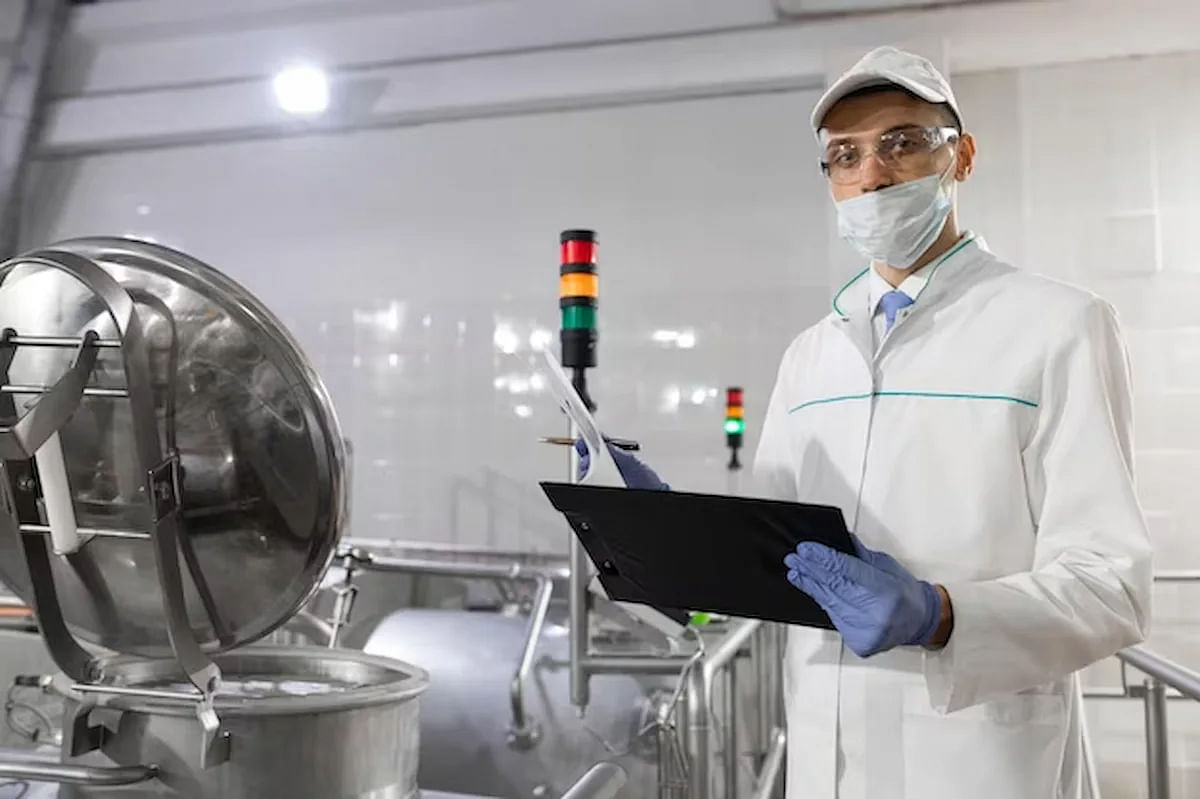


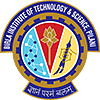


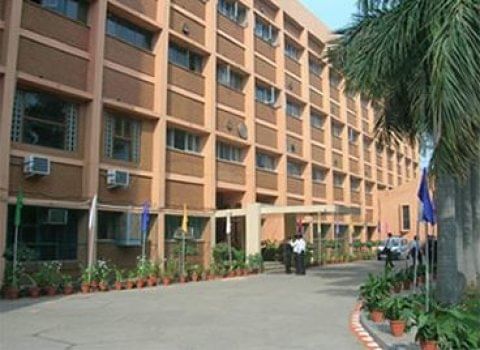

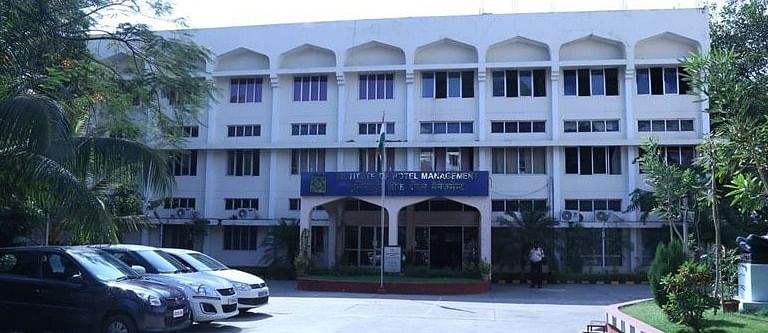


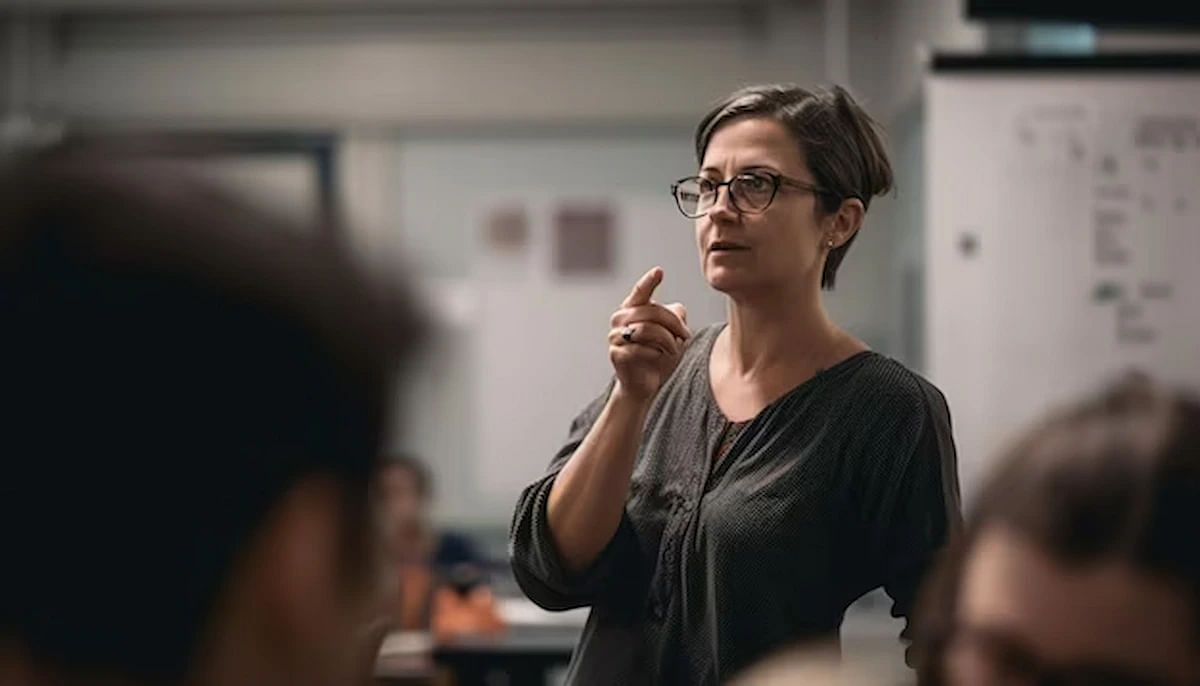





POST YOUR COMMENT